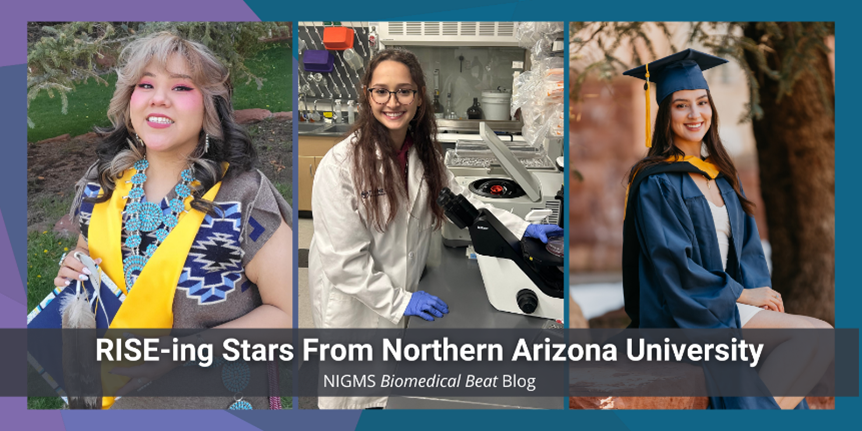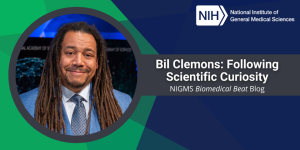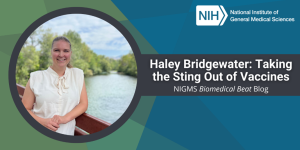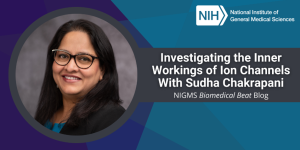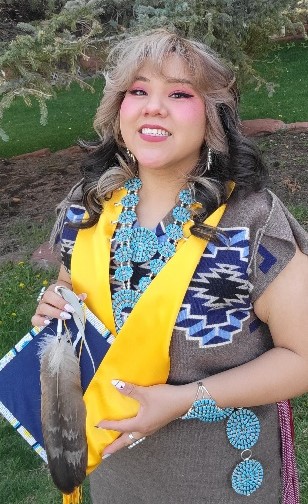
“Science is for everyone. It’s in everything. It exists in cultures everywhere,” says Chantel Tsosie, a master’s student in the NIGMS-supported Research Initiative for Scientific Enhancement (RISE) program at Northern Arizona University (NAU) in Flagstaff. The program aims to prepare a diverse group of students for research careers through culturally relevant support, hands-on research experiences, and a tailored curriculum.
Chantel started her bachelor’s studies at NAU as a dental hygiene major and later changed her focus to biomedical sciences. “I’m from the Navajo Nation, and growing up on the reservation, I wasn’t really exposed to research as a career. At NAU, I began taking classes like microbiology and chemistry and found that I loved the lab portions of those. I met scientists who were Indigenous and really started looking up to them,” she says. When a faculty member brought RISE to her attention, she was immediately interested and reached out to its leaders, Catherine Propper, Ph.D., and Anita Antoninka, Ph.D.
Chantel soon joined the program and began doing research in the lab of Matthew Salanga, Ph.D. She studies the pregnane X receptor (PXR), which helps cells sense foreign substances. Chantel specifically focuses on how a piece of DNA called exon 6 helps PXR do its job. Better understanding exon 6 could shed light on PXR’s interactions with other receptors, some of which are involved in maintaining bone health.
The RISE program has provided many opportunities beyond research to Chantel, such as being part of a supportive community of students from similar backgrounds, learning how to write scientific papers, and developing skills for sharing research with the public. “The RISE professors very much emphasized communicating science, because science is much more beneficial if you can share it,” she says.
Chantel is continuing her education through NAU and RISE as a master’s student, furthering the research she started as an undergraduate. She hopes to defend her thesis in the summer of 2024. Ultimately, she wants to earn a Ph.D. and become a professor at a Tribal university.
Confidence-Building Community
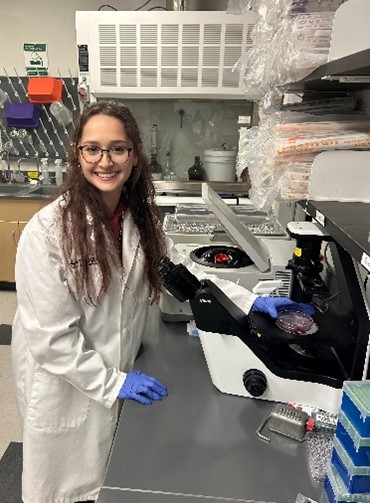
Crystal Morales has loved science for as long as she can remember. “I was that little girl who was always watching NOVA ScienceNow on PBS,” she recalls. Crystal’s focus on biomedical research came later, spurred by a fascination with cells, as well as by her cousin’s cancer diagnosis and her father’s passing from the disease.
As an undergraduate majoring in biomedical sciences at NAU, she began working in the lab of Naomi Lee, Ph.D. Crystal’s project focused on developing self-assembling peptides that could act as the foundation for a new type of human papillomavirus (HPV) vaccine. This new vaccine could be more robust and easily stored than the current one. In addition, the new vaccine would focus on HPV strains the current vaccine doesn’t cover, which are more common in Native American populations. This means that the new vaccine could provide better protection for these populations against HPV infection and the cancers it can cause.
At Dr. Lee’s suggestion, Crystal joined RISE as a master’s student while continuing the research she started as an undergraduate. The program had a huge impact on her. “The support system was amazing—not only the professors but also the fellow students. We were all first-generation-type students, and it was really nice to be among people who understood the struggles that come with that,” says Crystal. “We all pushed each other and felt like we could succeed together. That type of community helped a lot, and I genuinely cannot imagine having the confidence to go to a Ph.D. program without having that RISE experience.”
Crystal started a Ph.D. program at the University of Arizona in Tucson in fall 2022. She’s working in a colon cancer lab, studying how enzymes called kinases affect tumor growth. She greatly appreciates the experience that RISE provided in developing a dissertation, assembling a thesis committee, and addressing research challenges.
Originally, Crystal planned to work in the pharmaceutical industry after she graduated, but her experiences have led her to consider going into academia instead. “I’ve seen how influential professors can be in students’ lives, and it’s really making me wonder if I want to play that role,” she says.
Discovering and Navigating the Research World

Brenda Lujan didn’t have much guidance when it came to preparing for college. Her parents strongly encouraged her to pursue her degree, but they had grown up in rural Mexico and had limited educational opportunities. She started her undergraduate studies at NAU as a journalism major but realized she enjoyed her introductory biology course more than her first journalism course and changed her focus to biomedical sciences.
Brenda set her sights on medical school and worked as a certified nurse’s assistant while taking classes. Then, a friend who was part of RISE introduced Brenda to the world of research, and she began to see a future for herself as a scientist. “My time working in health care was eye opening and very humbling. Now, I approach research with the goal of improving the lives of the types of patients I worked with in the past,” she says.
Brenda joined RISE as a master’s student. She worked in the lab of Robert Kellar, Ph.D., developing a device for treating wounds affected by environmental contaminants, such as depleted uranium. A device like this could be particularly helpful in places such as the Navajo Nation, which has more than 500 abandoned uranium mines on or near its lands.
RISE also helped Brenda navigate earning her master’s degree, prepare for scientific conferences, and develop applications for Ph.D. programs. “It’s just amazing to have people supporting you who can help you get a leg up and give you the tools that someone like me didn’t have going into college,” she says.
In fall 2023, Brenda started a Ph.D. program at the University of Arizona to do research related to traumatic brain injuries. “Dr. Propper, Dr. Antoninka, and Dr. Kellar were monumental in shaping me into the scientist that I am today. I’m so grateful for them and my peers,” she says. “The opportunities and knowledge I gained through RISE were priceless.”
The NAU RISE program is supported by the NIGMS Research Training Initiative for Student Enhancement program through grant R25GM127199. Note: This grant’s funding mechanism has been recently updated, and details can be found on our webpage.
Other Posts You May Like
- Understanding Signaling Through Cell Membranes: Q&A With Chrystal Starbird
- Bil Clemons: Following Scientific Curiosity
- From Science Fair to Science Lab: Q&A With Chelsey Spriggs
- Haley Bridgewater: Taking the Sting Out of Vaccines
- Investigating the Inner Workings of Ion Channels With Sudha Chakrapani


